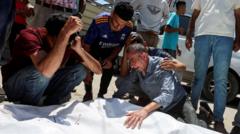The treaty establishes a framework for data sharing, equitable access to medical supplies, and technology transfer to strengthen global health security.
WHO Finalizes Historic Pandemic Treaty to Enhance Global Health Coordination

WHO Finalizes Historic Pandemic Treaty to Enhance Global Health Coordination
New international accord aims to improve response to future pandemics by ensuring resource sharing and collaboration.
The World Health Organization (WHO) has successfully negotiated a legally binding treaty aimed at enhancing global preparedness for future pandemics, following disorganized efforts highlighted during the COVID-19 pandemic. The new agreement focuses on key elements such as prompt data sharing related to emerging diseases, ensuring swift collaboration among scientists and pharmaceutical companies.
Dr. Tedros Adhanom Ghebreyesus, WHO director-general, hailed this agreement as "a significant milestone in our shared journey towards a safer world," showcasing that despite global disparities, nations can unite against shared health threats.
This pioneering treaty, reached after a three-year dialogue among member states, signifies only the second binding international accord in WHO's history, with the first being a tobacco control treaty in 2003. However, formal adoption will be required from member nations at the upcoming World Health Assembly next month. Notably, the United States was not part of the final discussions, as it is set to withdraw from the organization in 2026.
Key provisions in the treaty mandate that countries make pandemic-related medications accessible globally during outbreaks. Manufacturers must allocate 20% of their vaccine, therapeutic, and diagnostic production to the WHO; with a minimum of 10% donated, the remainder must be provided at affordable rates.
Furthermore, the treaty addresses the transfer of health technologies to lower-income nations, fostering local production of medical supplies during pandemics. Nonetheless, this aspect remains contentious, as many developing countries resent the hoarding of vaccines during COVID-19, and wealthier nations express concerns over the impact of compulsory technology sharing on their innovation.
At the heart of the treaty is the Pathogen Access and Benefit-Sharing System (PABS), designed to facilitate quicker data exchange among pharmaceutical firms. This initiative is expected to substantially enhance the ability to develop new medicines in response to future health crises, ultimately improving global health security for all.
Dr. Tedros Adhanom Ghebreyesus, WHO director-general, hailed this agreement as "a significant milestone in our shared journey towards a safer world," showcasing that despite global disparities, nations can unite against shared health threats.
This pioneering treaty, reached after a three-year dialogue among member states, signifies only the second binding international accord in WHO's history, with the first being a tobacco control treaty in 2003. However, formal adoption will be required from member nations at the upcoming World Health Assembly next month. Notably, the United States was not part of the final discussions, as it is set to withdraw from the organization in 2026.
Key provisions in the treaty mandate that countries make pandemic-related medications accessible globally during outbreaks. Manufacturers must allocate 20% of their vaccine, therapeutic, and diagnostic production to the WHO; with a minimum of 10% donated, the remainder must be provided at affordable rates.
Furthermore, the treaty addresses the transfer of health technologies to lower-income nations, fostering local production of medical supplies during pandemics. Nonetheless, this aspect remains contentious, as many developing countries resent the hoarding of vaccines during COVID-19, and wealthier nations express concerns over the impact of compulsory technology sharing on their innovation.
At the heart of the treaty is the Pathogen Access and Benefit-Sharing System (PABS), designed to facilitate quicker data exchange among pharmaceutical firms. This initiative is expected to substantially enhance the ability to develop new medicines in response to future health crises, ultimately improving global health security for all.





















